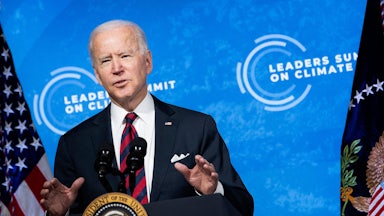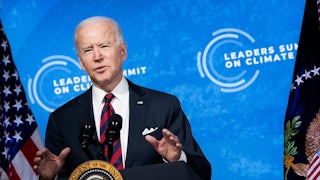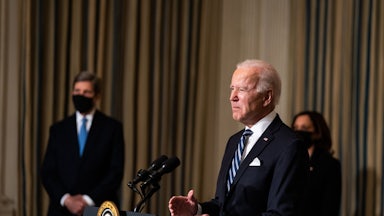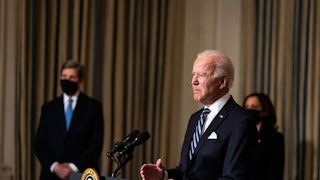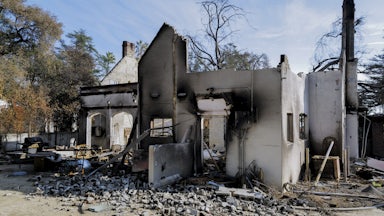Republican governor and former MAGA acolyte Ron DeSantis has focused more on climate during his first term than would be expected of most right-wingers of his ilk. It’s not because he wants to—in fact, talking openly about the climate crisis could hurt his 2024 presidential ambitions with the Republican base—but because he has no other choice. Climate will be a key “issue” in the 2022 Florida gubernatorial campaign and could offer a preview of how politicians nationwide will handle the crisis going forward. There is reason, unfortunately, to be skeptical that all this talk will lead to action.
The climate crisis is not a theoretical, futuristic abstraction anywhere at this point. But it’s particularly urgent in the state of Florida. A 2018 study found that the state is already dealing with increasingly devastating hurricanes, sea level rise, and extended mosquito seasons (especially troubling given mosquitoes’ propensity to carry and spread disease), in addition to coral reef extinction and extended drought. Florida may be unrecognizable, with a minimum of a third of its land underwater, by 2100. That may even be a generous estimate—hurricanes and other extreme weather could accelerate that timeline.
DeSantis has allotted billions of dollars of government funding to climate crisis “mitigation” efforts, such as seawall building in communities exposed to rising sea levels. He has protected some public land from drilling and has promoted electric cars and buses. And unlike Joe Biden, DeSantis has expressed disapproval of fracking, though he has not explicitly fought the practice as a policy matter. This is the kind of boilerplate stuff you’d expect from a Democratic leader in a Northeastern or West Coast blue state. And it’s occurring in a state that has leaned red since 2014, with a GOP voting base that skews pretty far to the right.
Because DeSantis has behaved in such a way as to be awarded a “D” grade by the Sierra Club, as opposed to Donald Trump’s “F”s, the political press has occasionally made him out to be some sort of environmentalist. “Under Gov. DeSantis, Florida’s story on the climate crisis is starting a new chapter,” the Sun Sentinel editorial board wrote in May 2019.
In reality, DeSantis represents a reactive, Band-Aid approach to the climate crisis, rather than serious, proactive, and collective action. He’s supported some “mitigation” efforts, some green infrastructure investment and public land protection here and there, but ultimately no emissions-reduction commitments. In some cases, he’s supported emissions increases.
DeSantis’s potential general election opponents for 2022 have promised to make climate a central focus of their campaigns. “Florida deserves better and somebody who has a greater focus on the environment all the time instead of just some of the time,” former GOP governor turned Democratic Party Congressman Charlie Crist told a reporter in mid-April.
Crist, who served as Florida’s governor from 2007 to 2011, was seen as environmentally friendly—though we know from the way DeSantis has been covered that standards are low. A believer in “market-based solutions” to the climate crisis, Crist as governor enacted emissions-reduction legislation, as well as various environmental regulations and standards. Recently, Crist introduced carbon-pricing legislation in Congress that would supposedly cut “U.S. carbon pollution by up to 45 percent by 2030, with a net-zero target by 2050.” Given that the legislation is supported by the American Petroleum Institute, which praises the bill’s “middle ground” approach, many environmentalists question the bill’s seriousness.
Also running for the Democratic Party nomination is Nikki Fried, Florida’s incumbent commissioner of agriculture and consumer services. Fried, Florida’s only statewide-elected Democrat, has feuded with DeSantis over energy and climate policy. The two wrestled over control of Florida’s Office of Energy in January 2020, when DeSantis unsuccessfully tried to pry the office from Fried’s control. Fried has continued to criticize DeSantis’s environmental agenda and recently took part in a major Earth Day climate forum.
But while it’s nice to see gubernatorial candidates focusing on the climate crisis, it’s dangerous to assume that increased climate focus will automatically result in increased climate action. Another election where climate was similarly important has already shown the disconnect between rhetoric and actual policy. Halfway around the world, Australia might offer a preview of what is to come in Florida—and elsewhere.
There is no talking around global warming in Australia any more; it can’t be done. The country has dealt in recent years with horrific wildfires, boom-bust cycles of extreme drought and flooding, and the ongoing extinction of the world-famous Great Barrier Reef. A majority of voters in the 2019 Australian general election declared that climate was a key factor in their voting decision. A staggering 80 percent (and 90 percent of young voters) believed that the government needs to take more action on climate change.
The center-left Australian Labor Party during the campaign proposed a 45 percent emission cut by 2030, 50 percent renewable energy by 2030, and widespread industrial reinvention. The right-wing Liberal-National Coalition were much more cautious: Yes, climate change is real, they suggested, but there was no need for substantial emissions cuts, nor for renewable energy investment. In fact, Prime Minister and Coalition leader Scott Morrison has throughout his tenure touted fossil fuel extraction and coal mining and supported President Trump’s climate denial. Yet it was the Coalition that won the May 2019 election.
The Coalition’s surprise win can be attributed to overlooked and underpolled white working-class voters in rural regions, particularly in the northeastern Australian state of Queensland. Queensland relies heavily on coal production. The Coalition’s touting of fossil fuel extraction in the abstract—and spouting standard arguments about the job displacement and heavy financial costs of energy transition—probably won votes in this region.
In this sense, Australia’s politics are somewhat similar to those of the United States, where votes in local economies dependent on fossil fuel extraction, pipelines, and fracking hold disproportionate sway over electoral politics. But there’s another similarity on a more basic, psychological level: Even those who know climate change to be real don’t necessarily want to think about it or support policies that address it. Of Floridians who called climate change a “serious problem” in 2020 exit polls, a startling 31 percent supported Donald Trump, whose administration’s obstruction of climate policy and support of new drilling was notorious.
The problem may lie in how voters perceive the urgency of the climate crisis. Polling in the Sunshine State suggests that Florida residents are just as concerned about the climate crisis as Australians, with 75 percent of Floridians expressing “concern” about global warming. However, when polling asks voters to get a little more specific, a murkier picture arises. A Pew Research poll conducted during August 2020 found that only 42 percent of Americans considered the climate crisis to be “very important” to their vote, eleventh on the list behind issues like the economy, health care, and gun violence. Only 11 percent of Republican voters, it is worth noting, said climate would be a “very important” consideration to their vote.
Similarly, when The New York Times asked Florida voters in October 2020 how worried they were “that rising sea levels from global warming will have a significant impact on [their] lives,” only 24 percent answered “very worried.” Thirty percent said they were “somewhat” worried, 19 percent said “not too” worried, and 25 percent said “not at all.”
For many, climate is an important but ultimately laundry-listed issue that can be dealt with in the abstract future; thus one can see the appeal of political rhetoric built around the notion that “climate change is real and human-made, but we must first consider the economy!” This is precisely the approach politicians like DeSantis and Morrison are taking—and the one we can expect from many conservatives and centrists going forward.
The 2022 Florida governor’s race may show us the future of American climate politics, absent a strong countervailing narrative from the left: Even with the climate crisis getting more coverage than ever before, there will be limits, as seen in Australia, to what politicians are willing to do about it. What’s long been needed is dramatic, sweeping action; the plans proposed by politicians like DeSantis and Charlie Crist fall short of that.

